
by Andrew Corbett | Jan 23, 2023 | Bible Prophecy |
The Western Wall which exists today is not the same wall that existed in the time of Christ. Firstly, it was still under construction, and not completed till a few years later. After the Romans had damaged it, it began to be reconstructed under the Umayyad Caliphate in the seventh century, then what has survived to the present day was completed by the Byzantine Empire several centuries later. This is important to know because then we can recognised that the predictions given by Jesus in Matthew 24 were indeed fulfilled just as He said they would be — and, just at the time He said they would be.
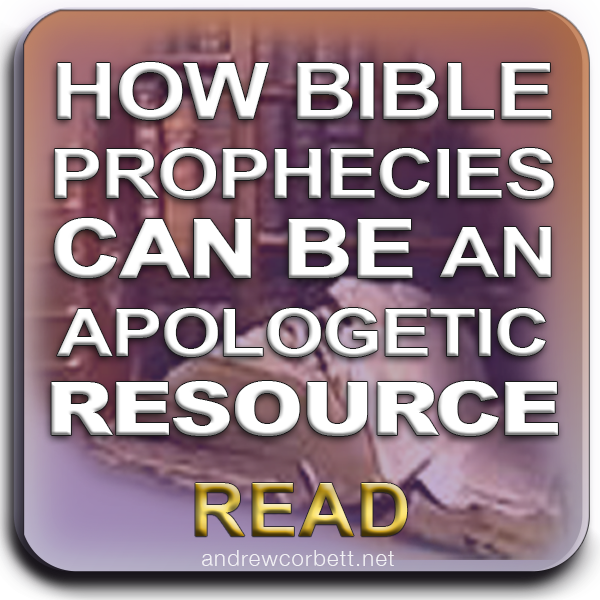
by Andrew Corbett | Sep 29, 2021 | Apologetics |
What are the statistical odds that an ancient prophecy could just ‘get lucky’ and have its prophecy fulfilled? The odds dramatically increase when an ancient prophecy involves more details. Note the qualifications of Professor Peter Stoner. Then note his statistical analysis of how likely it would be for an Old Testament biblical prophecy with 16 or more specific details to randomly be fulfilled:
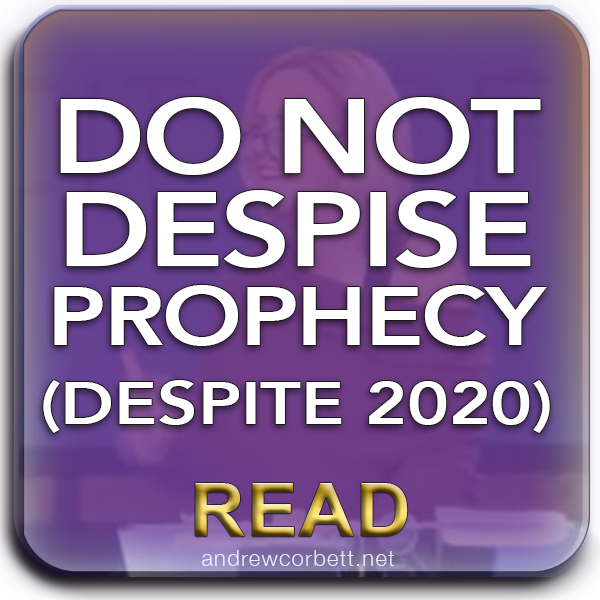
by Andrew Corbett | Jan 25, 2021 | Theology |
I believe in prophecy and I believe in prophets. But based on what I know from Scripture both are rarer than many would have us believe. I suspect though that there a lot of Christians who used to share my acceptance of the validity of prophecy and prophets — who no longer do due to the events of 2020. One of the many reasons I believe in prophecy and prophets is the teaching of Scripture. I will use one particular two-verse passage to bookend this week’s pastor’s desk to make my case.

by Andrew Corbett | Dec 27, 2020 | Eschatology |
Much of what is taught by Bible-prophecy teachers about the end-times” is grounded in Paul’s two epistles to the Thessalonians. It is claimed that in First Thessalonians, Paul introduced the notion of a rapture. And it is believed that from Second Thessalonians, he introduces believers to some revelations about the “Antichrist”. The Apostle certainly does share some divinely inspired insights into what was future to his original audience. But the modern reader may not understand how future it was to these Thessalonians – which may mean that it is not future to us.
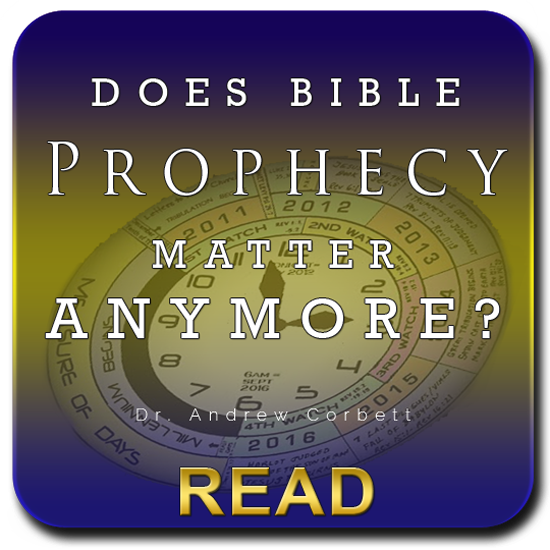
by Andrew Corbett | Jul 29, 2018 | Bible Prophecy |
Does Bible Prophecy matter anymore? With so many Bible Prophecy teachers making so many wild interpretations of what the Bible supposedly teaches will happen in our near future, who have time and time again been proven wrong, the believer could be forgiven for simply abandoning the Bible as being prophetically credible. But being convinced in the inerrancy of Scripture and aware that much of what is taught in Dispensational churches inadvertantly attempts to undermine the inerrancy of Scripture by its false prophetic interpretations, I set about to study the subject of Bible Prophecy and learn for myself what the Bible really says and predicts.
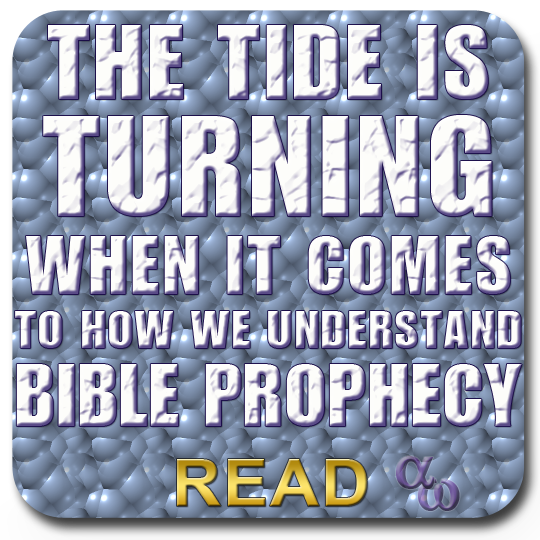
by Andrew Corbett | Jul 4, 2018 | Bible Prophecy |
I remember as a young boy going to church on a Sunday evening and hearing the Bible Prophecy teacher give his end-times-chart-on-the-bedsheet-on-the-wall talk and feeling both excited and scared.”Excited” because it was reassuring to hear how accurate the Bible was in matching prophecy with history. “Scared” because the Bible apparently said that the ‘last days’ were going to be hell-on-earth! I was taught that the USSR was the bear of Ezekiel and also described as Gog and Magog. I was told that the Anti-christ was alive today in America and already plotting his world take-over. I heard that a time of Great Tribulation was coming on the earth to punish Israel for rejecting their Messiah and forming an alliance with the Anti-christ who will eventually rebuild Solomon’s Temple in Jerusalem. This would all lead to the battle of Armaggeddon where millions of people would be killed in the mother of all battles. But most evangelistically I was told that I could escape this coming doom by committing my life ot Christ and therefore qualify for being “raptured” just before this final seven year period began.
Like my interstate pastor friend, I just thought this was the traditional, orthodox doctrine. I mostly ignored the inconsistencies this understanding presented. I just let the questions mount. Then one day when I was still young, I heard another pastor teaching about end times who seemed to suggest that not only wasn’t this the traditional way of understanding Bible Prophecy, it was also not orthodox! That is, he said that the Bible couldn’t teach this. He called it “Dispensationalism”. Back then, Hal Lindsay was the paperback champion of Dispensationalism while Dr John F. Walvoord (of Dallas Theological Seminary) was the hardback champion. In my boyhood church no-one questioned these Bible authorities. Dozens of Bible Prophecy teachers were spawned by these authors. Each one reiterated the Dispensational interpretation of the Bible and too few of us realised that we weren’t just being told how to interpret Bible prophecy…

by Andrew Corbett | Jun 25, 2018 | Hermeneutics |
Professors Gordon Fee and Douglas Stuart state that the entire framework of the New Testament is eschatological (How To Read The Bible For All Its Worth, 2003:145). “Eschatology”, they write, “has to do with the end, when God brings this age to its close.” Hence my double entendre heading – Understanding what the Bible teaches about “finally” (Eschatology) is necessary in order to understand what the New Testament teaches…
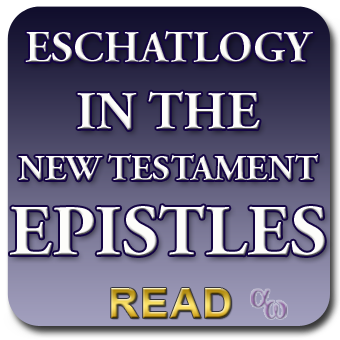
by Andrew Corbett | Apr 5, 2018 | Eschatology |
New Testament epistles are sprinkled with eschatological references which have led to confusion and the belief that the rules of hermeneutics must be re-written to accommodate particular eschatological systems. We will now survey how these Epistles make eschatological references and how we might best understand them.
A Sense of Imminence
¶ The end of all things is at hand; therefore be self-controlled and sober-minded for the sake of your prayers.
First Peter 4:7
The eschatology found in the New Testament Epistles conveys an expectation of imminence. Each of the writers had a sense that something was about to happen very soon. It could be argued that they were misguided and that the Scriptures accurately recorded their misinformed views. We see evidence of this sort of thing throughout the Old Testament where misinformed human perspectives were accurately recorded in God’s inspired Word. This includes such statements like, “from the rising of the sun” (Psalm 50:1; Isaiah 45:6; Malachi 1:11). Of course, we know that the sun doesn’t rise but from the perspective of the human authors it appeared to. But this doesn’t seem to be the sort of thing happening in the Epistles. Unlike the genre of the Psalms or Prophets, these eschatological statements found in the Epistles are not poetic. They are presented as statements of fact – often linked to an injunction (1Peter 4:7; Hebrews 10:24-25). If it is the New Testament perspective is actually just the accurate recording of misguided human opinion, it then makes the linked injunctions (moral commands) redundant.









